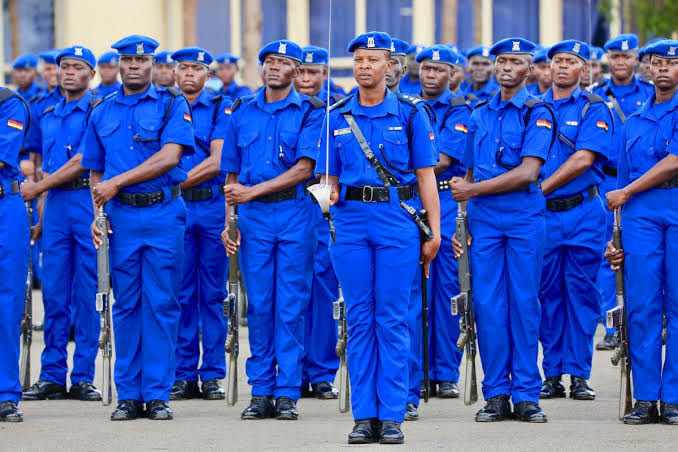NAIROBI, Kenya, Feb 25- Top police bosses from across the country are expected to undergo a four-day training on how to combat Sexual and Gender-Based Violence (SGBV) during this electioneering period.
Lobby groups and government agencies have since raised an alarm over the rising numbers of SGBV cases, with the trend expected to rise steadily during political campaigns, if no measures are put in place to combat them.
While the government has come up with a multi-sectoral approach to deal with cases of SGBV, police are expected to play a critical role, due to their legal mandate in enforcing the law.
As such, SGBV training has been incorporated in the forthcoming training of all the 47 County Commanders, according to Commissioner of Police, Dominic Kisavi. Also to be present are all the County Criminal Investigation Officers. The training will kick-off on March 1 to 4.
Kisavi is the Head of the Elections Preparedness Secretariat in the National Police Service.
“We are ready to ensure the current trend is reversed,” he said during a Twitter Space held on Friday, that was hosted by the United Nations Population Fund Youth Advisory Panel.
The Twitter Space was moderated by Crime Journalists Association of Kenya Secretary-General Joseph Muraya.
Also present was Policare project coordinator Superintendent of Police Zipporah Nderitu.
According to Kisavi, the March training will focus on enlightening the police bosses on how to deal with victims of SGBV and more so during the electioneering period.
“We want the police to be responsive and empathetic,” he said. “One of the strategies to ensure that our women and girls are protected is through the training of our police officers. They will be trained on how to handle victims and also to extract and preserve evidence.”
He said this will encourage more victims to come out and seek justice.
Kisavi warned that officers that will be found assisting perpetrators of SGBV to evade justice will be brought to book.
“We will not entertain such behaviours,” he asserted.
With Policare, he said more victims will become comfortable to share their pain with the police and get help.
But what is policare?
Nderitu, who is the project coordinator, said it is an integrated model of the National Police Service, that is geared towards the protection and prevention of SGB.
“It is intended to be a one-stop model geared to address cases of SGBV,” she said.
“We are seeking to harmonise and synergize SGBV interventions among all key stakeholders.
Already, Policare centres have been set up in Nairobi, Makueni, and Laikipia Counties, before the initiative can be launched across the country.
“We are going to have all stakeholders under one roof,” he said. “We are going to shorten their journey…this is the only crime the victim has to be taken through a referral pathway.”
She said the pilot model is being implemented within a police station.
In the future, she said, they will be seeking to have policare centres established outside the police stations.
“The ideal policare model should be outside normal police operational area,” she said. “It should even be in an unmarked building where only the victim knows what services they are seeking.”
This is meant to build confidence for victims of SGBV. Some of the cases are perpetrated by rogue police officers.
“With policare, we shall be able to restore the dignity of SGBV victims. You can never find a shopping mall where dignity is sold,” she said.
A policare centre has an interview room for women and children, a criminal records room, a triage, forensic evidence storage room, a trauma centre, a room for medical examination and P3 issuance and male and female holding cells.
Policare centres are set to be staffed 24 hours a day and supported by toll-free service to reach more survivors.
Speaking during the Twitter Space, Winfred Mutindi, an officer with the National Gender Equality commission said there has been a surge of SGBV cases since the COVID-19 pandemic struck Kenya in March 2020.
“We have seen a reverse of some of the major gains in the war against the vice,” he said. “SGBV is used as a tool and more so against women candidates during the electioneering period.”
Sexual offences, she said, have been on the rise, compared to other forms of SGBV.
“Our children have not been spared. Through FGM, we have also had our girls undergo the cut,” she said.
“SGBV does not only affect women but also men. It is a worrying trend despite the progressive policy and legislative framework. A lot still needs to be done.”
With policare, she said more victims are likely to come out and report the cases of SGBV.
UNFPA Youth Advisory Panel chairperson Leshan Kereto urged the youth to take interest in fighting the vice.
Stakeholders in the war against the vice were challenged to engage victims “at the ground and leave the hotel rooms.”
Sexual and other forms of violence against women have devastating consequences including injuries and serious physical, mental, sexual, and reproductive health problems, including sexually transmitted infections, HIV, and unplanned pregnancies.
Want to send us a story? Contact Shahidi News Tel: +254115512797 (Mobile & WhatsApp)


